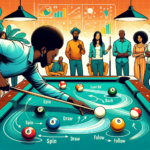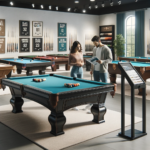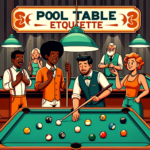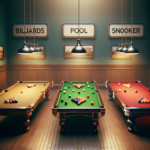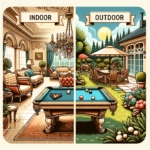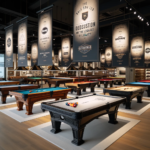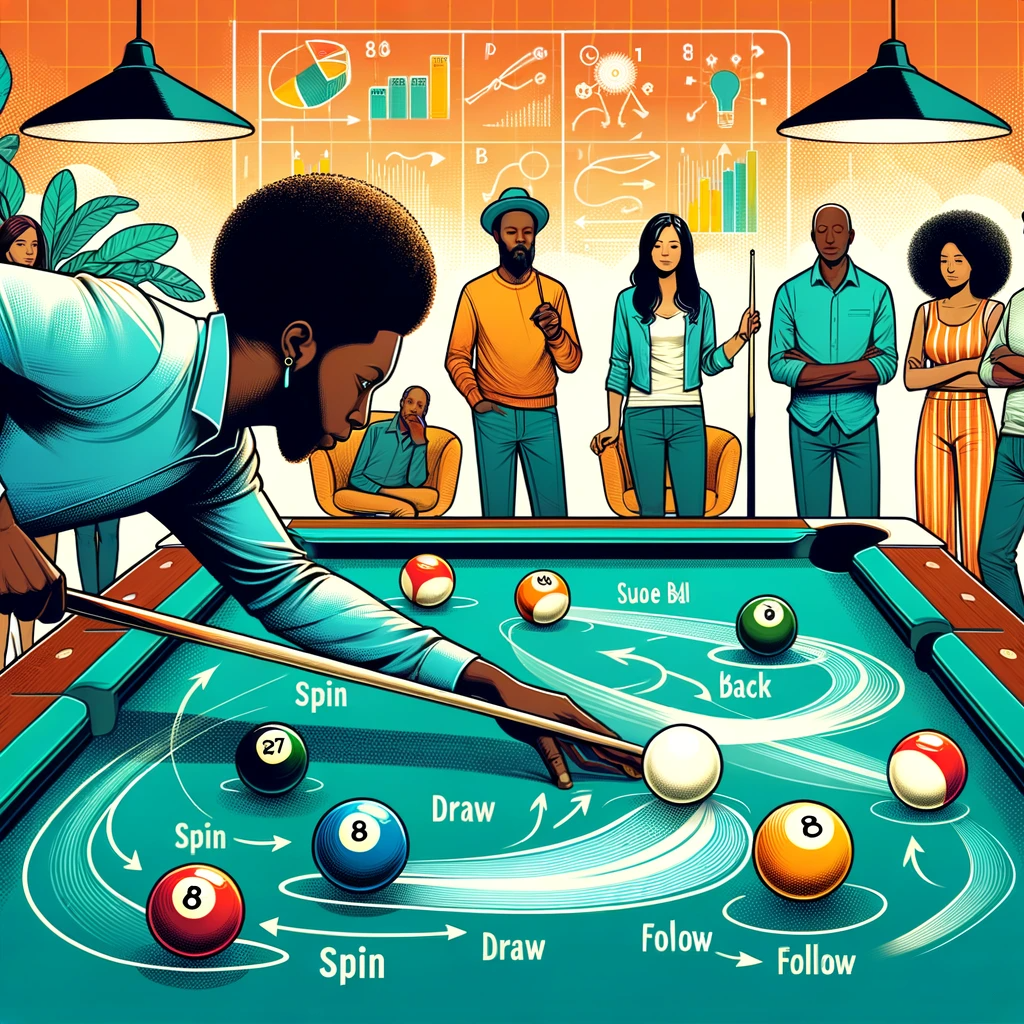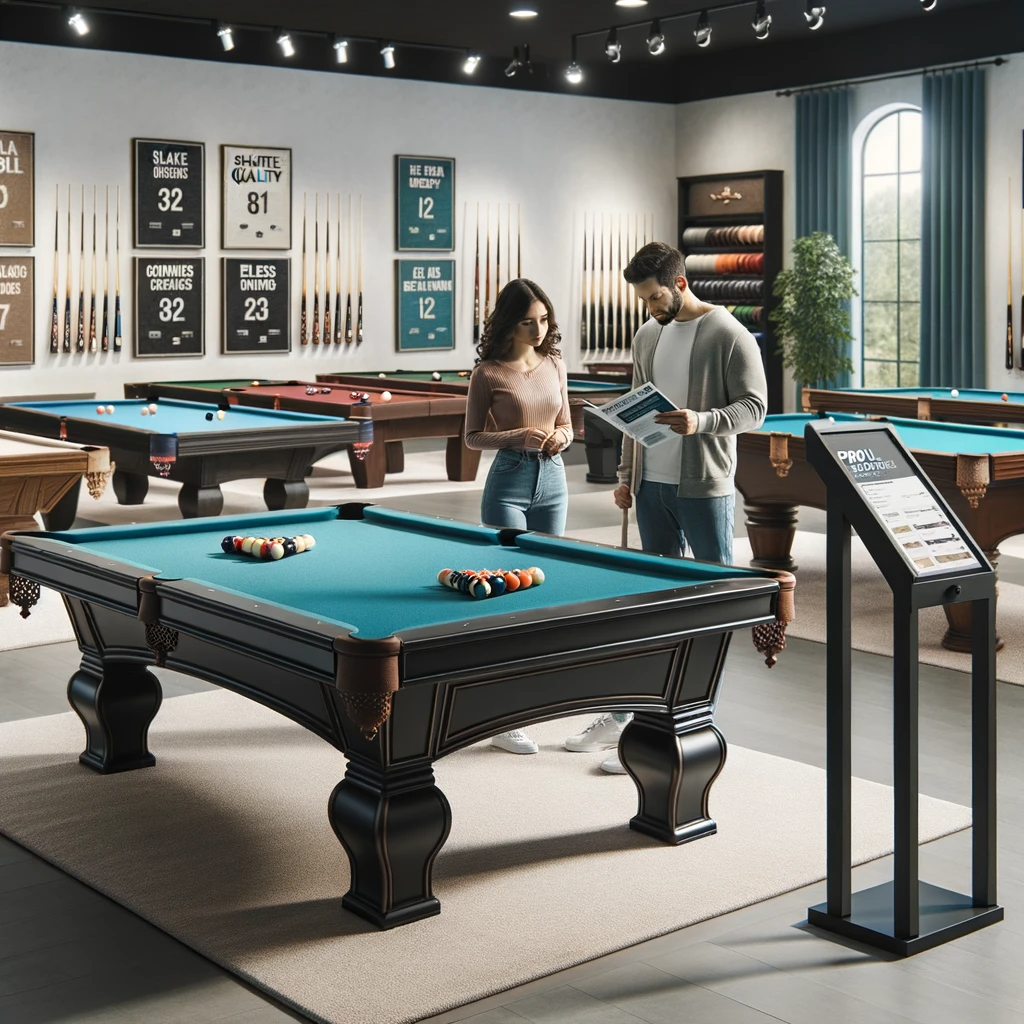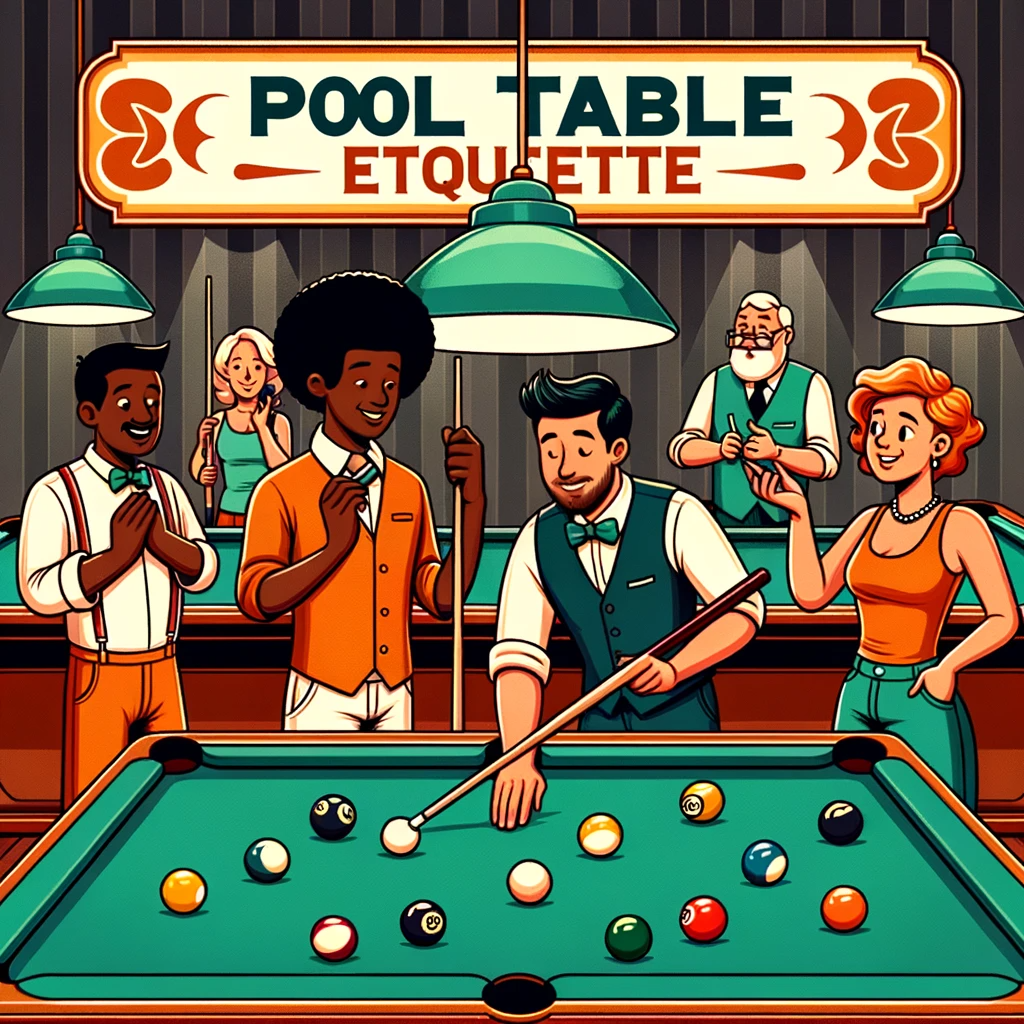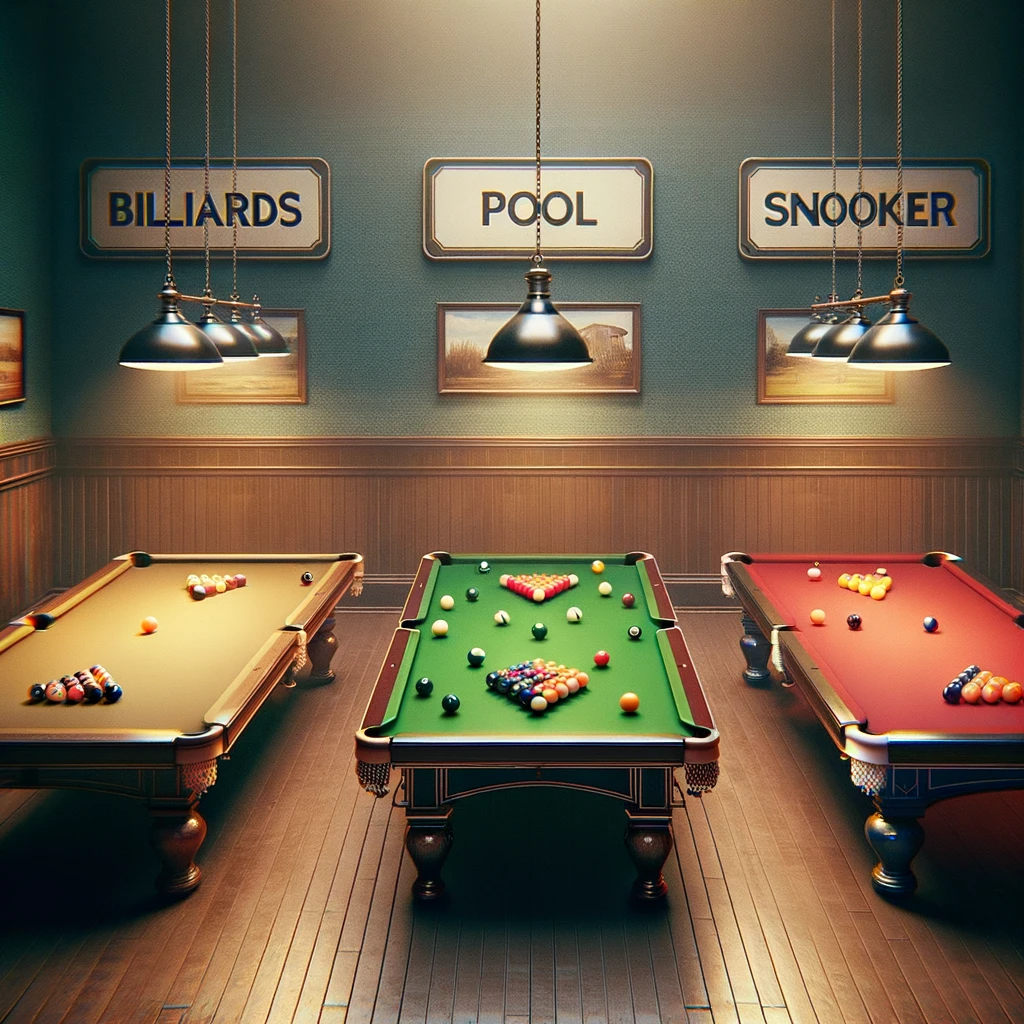Introduction
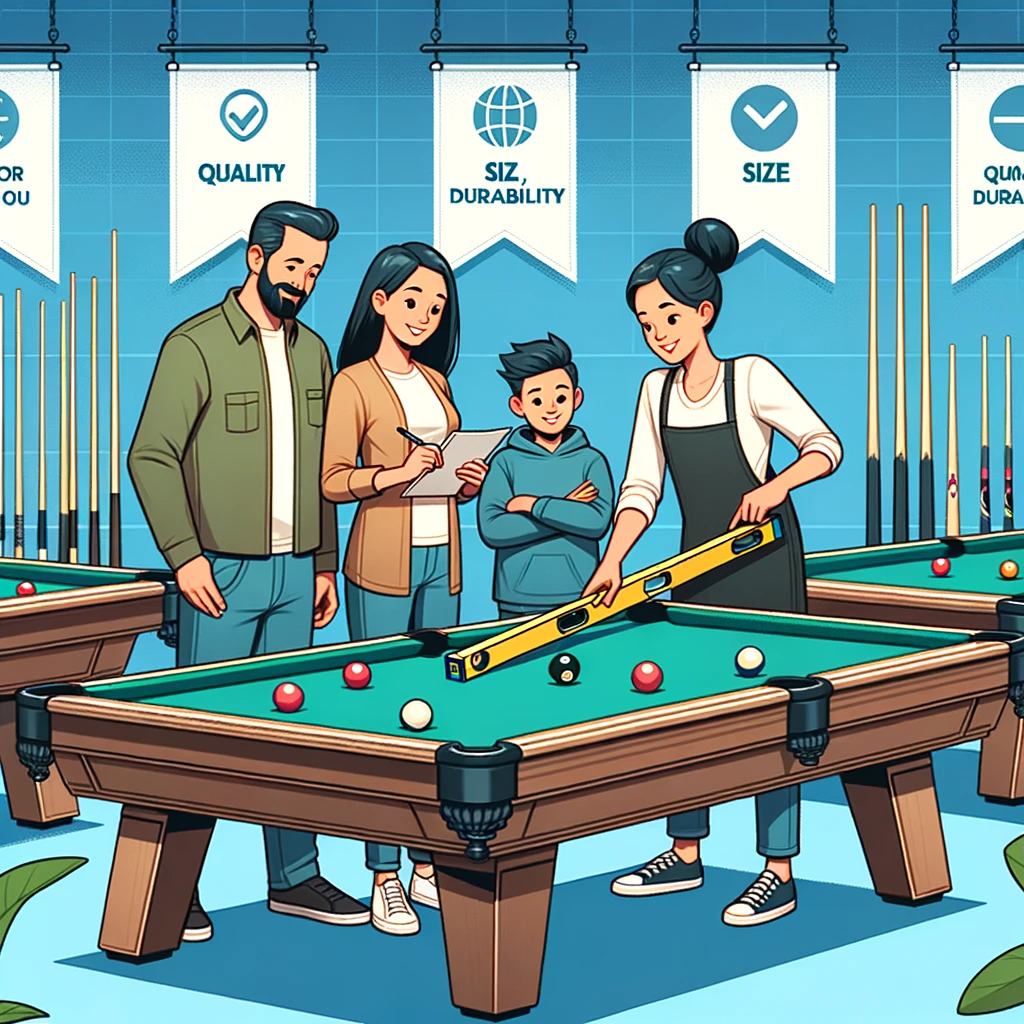
Brief history of pool tables The origins of pool tables can be traced back to the 15th century when a predecessor game, known as billiards, gained popularity in Europe. Initially played on the ground, it eventually evolved into a table-based game.
The first recorded evidence of a standalone pool table dates back to the early 1600s in England. These early tables were made of wood and had cloth-covered surfaces.
Over time, advancements in materials and design led to more refined and sophisticated pool tables. Importance of choosing the right pool table.
Choosing the right pool table is crucial for ensuring an optimal playing experience and long-lasting enjoyment. A high-quality pool table will not only enhance your gameplay but also add aesthetic value to your space.
Whether you are a casual player or an avid enthusiast, investing in a suitable pool table that meets your specific requirements is essential. A well-chosen pool table should have durable construction, reliable playing surfaces, and appropriate size dimensions for the available space.
It should also complement your personal style preferences and budget constraints. By selecting the right pool table, you can create an inviting environment for friendly gatherings or competitive play while enjoying years of entertainment.
Understanding the Basics of Pool Tables
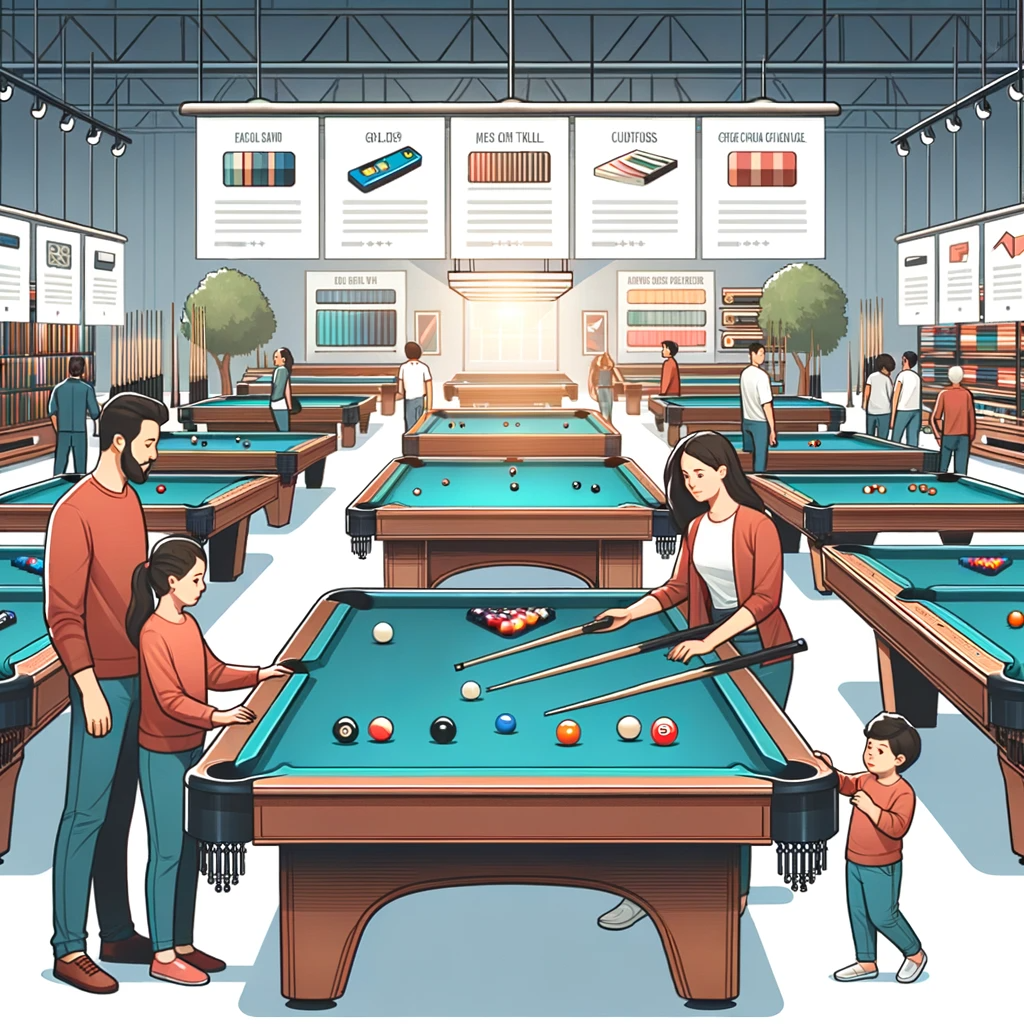
Components of a pool table
A pool table consists of several essential components. Firstly, there is the slate, a smooth and flat playing surface that provides optimal ball roll and durability. Secondly, the rails surround the playing area and are usually made of wood or rubber.
These rails serve as cushions for banking shots. Thirdly, there are the pockets where balls sink after being pocketed.
Pockets can be made of leather or molded plastic and come in various sizes and shapes. The cloth covers the playing surface and greatly impacts ball movement.
Different types of pool tables
There are two main styles of pool tables: American-style and English-style. American-style tables, also known as “pocket billiards” or “pool” tables, have larger pockets that make potting balls easier. English-style tables, commonly referred to as “snooker” tables, have smaller pockets which require more precise shots for successful potting.
Sizes and dimensions of pool tables
Pool tables come in different sizes to suit various settings and purposes. The most common sizes are 7-foot, 8-foot, and 9-foot tables. A 7-foot table is adequate for home use but may feel crowded in professional play or larger spaces.
An 8-foot table offers a balanced experience suitable for both recreational play at home and some commercial establishments like bars or small game rooms. A 9-foot table is considered a professional-size table often seen in tournaments or dedicated billiards halls where ample space can accommodate its larger dimensions.
Budget considerations
When considering buying a pool table, it is crucial to take your budget into account. The price range for pool tables can vary significantly depending on various factors. High-quality pool tables typically range from $1,500 to $10,000 or more.
However, there are also budget-friendly options available starting from around $500. It’s important to remember that the price often reflects the quality and materials used in the construction of the table.
Price Range for Pool Tables
The price range for pool tables can be influenced by several factors such as the size of the table, materials used, brand reputation, and overall craftsmanship. Larger pool tables tend to be more expensive than smaller ones due to the increased amount of materials required for construction. Additionally, high-end pool tables often feature premium materials such as solid wood frames and slate playing surfaces which contribute to a higher price point.
Cost of additional accessories (cue sticks, balls)
In addition to the cost of the actual pool table itself, it is essential to consider the cost of additional accessories needed for gameplay. Cue sticks are an integral part of playing pool and can range in price depending on their quality and construction material. Entry-level cue sticks typically start around $20-$50, while professional-level cues can go up to several hundred dollars.
Pool balls are another essential accessory that should not be overlooked when factoring in your budget. While basic ball sets may be included with some pool tables, higher-quality balls made from materials like phenolic resin or Aramith can offer better durability and improved playability but come at a higher cost.
Available space in your home or establishment
The size of your available space plays a crucial role in determining what type and size of pool table will fit comfortably within your home or establishment.
Measuring the room for proper fit and clearance
Before making a purchase, it is essential to measure the room where you plan to place the pool table. Measure the available length and width, ensuring that you leave enough space around the table for players to comfortably move and take shots. As a general guideline, it’s recommended to have at least five feet of clearance on all sides of the table.
Considering room aesthetics and layout
Aside from ensuring that the pool table fits in your space, it’s also important to consider how it will harmonize with your room’s aesthetics and layout. Certain pool table designs are better suited for specific interior styles or themes. Assessing factors such as color schemes, materials used in furniture, wall decorations, and lighting can help you select a pool table that complements the overall ambiance of your space.
Types of Pool Table Materials and Construction
Slate vs Non-slate tables
Slate tables, made from slabs of natural stone, are widely considered the gold standard in pool table construction. The smooth and level playing surface provided by slate imparts superior accuracy and consistency to shots.
Conversely, non-slate tables are constructed with alternative materials such as Medium-Density Fiberboard (MDF) or plywood. While more affordable, non-slate tables are generally regarded as inferior due to their tendency to warp or deteriorate over time.
Advantages and disadvantages of slate tables
Slate tables offer numerous advantages that contribute to a high-quality gameplay experience. Firstly, the exceptional stability and durability of slate ensure minimal table movement during play, maximizing precision.
Additionally, slate’s ability to retain a consistent temperature allows for reliable ball roll and minimizes the impact of environmental factors. However, slate tables also have their downsides; they tend to be significantly more expensive than non-slate alternatives due to the cost of sourcing and installing the heavy slabs.
Alternatives to slate (MDF, plywood)
For those seeking a more budget-friendly option or lighter weight table, non-slate alternatives like MDF or plywood can be considered. These materials offer cost savings and increased portability compared to slate tables.
However, it is important to note that MDF or plywood lacks the same level of durability and playing performance as slate. They are prone to warping over time and may not provide the same level of ball control or consistency in gameplay.
Different types of cloth materials
Two main types of cloth materials used on pool tables are woolen cloth and worsted cloth. Woolen cloth is commonly found on recreational pool tables due to its affordability. It provides a slower playing surface with more friction between the balls and the cloth.
On the other hand, worsted cloth is a higher-quality option predominantly used in professional and tournament settings. Its smooth texture and tighter weave result in faster gameplay with less ball friction and improved accuracy.
Woolen cloth vs worsted cloth
Woolen cloth, made from wool fibers, offers a softer surface that tends to hold chalk better and provides more control for beginners or casual players. However, it can be more prone to pilling and wear over time. In contrast, worsted cloth is typically made from a blend of wool and nylon or polyester.
Its tightly woven construction creates a slick playing surface that allows for faster cue ball travel and smoother shots. Although worsted cloth may require more frequent cleaning due to its low nap, it generally offers better durability compared to woolen cloth.
Impact on gameplay and durability
The choice between woolen or worsted cloth can greatly influence gameplay dynamics and table maintenance requirements. Woolen cloth’s slower pace can be advantageous for players seeking more control over shots but may not suit those who prefer fast-paced games with longer runs of balls.
Conversely, worsted cloth’s speedier playstyle favors precision play but requires adjustments in shot technique due to reduced spin retention on the surface. Additionally, while both types require regular brushing and occasional re-felting, worsted cloths are generally more resistant to wear patterns caused by repeated ball impacts due to their tightly woven structure.
Choosing the Right Pool Table Size for Your Needs
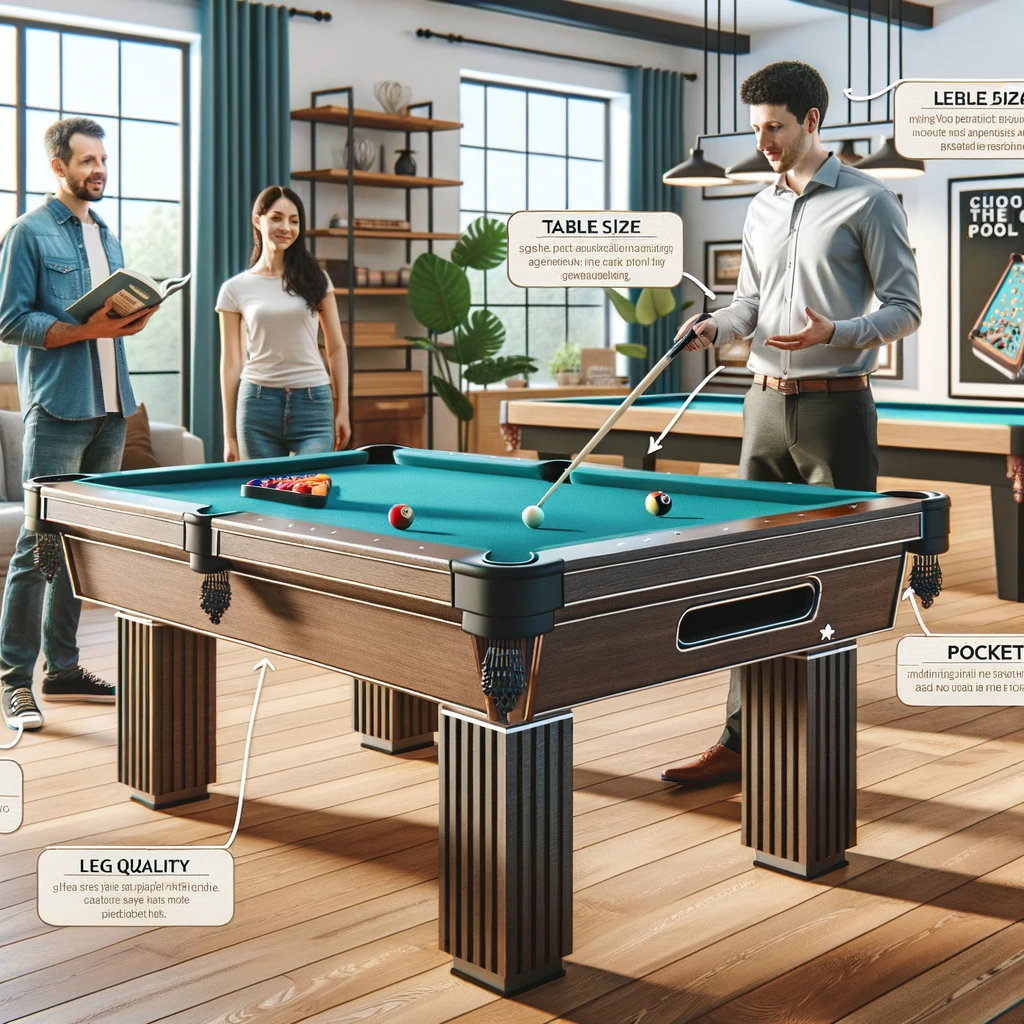
Standard sizes and their suitability for various settings
Standard pool table sizes range from 7-foot, 8-foot, to 9-foot tables. The 7-foot tables are commonly found in homes and smaller recreational spaces.
They are ideal for casual play and beginner-level players who want to enjoy the game in a more compact setting. The 8-foot tables strike a balance between space-saving and providing a slightly larger playing surface.
These tables are suitable for both home use and commercial spaces like bars or game rooms. For those seeking a more professional experience or intending to host tournaments, the 9-foot tables are the standard choice.
These larger tables offer ample playing area, allowing players to showcase their skills without feeling cramped. Commercial establishments that cater to serious pool enthusiasts or professional players typically opt for these regulation-sized tables.
Home use vs commercial use
When choosing a pool table size, it’s important to consider whether it will primarily be used in a residential setting or a commercial environment. For home use, factors such as available space and room layout come into play.
Smaller rooms may not be able to accommodate larger sized pool tables comfortably, whereas spacious areas can handle regulation-sized tables without feeling crowded. In commercial settings like bars or game rooms, it’s essential to take into account the target audience and usage patterns.
If the establishment caters more towards casual players or social gatherings where the focus is on entertainment rather than serious gameplay, smaller sized pool tables may suffice. However, if the intent is to attract skilled players or host tournaments, investing in larger-sized professional-grade pool tables would be more appropriate.
Recreational vs professional play
The distinction between recreational play and professional play also influences the choice of pool table size. Recreational players who enjoy occasional games with family and friends may lean towards smaller-sized tables. These tables provide a comfortable setting for players of varying skill levels to enjoy friendly matches.
On the other hand, professional play demands regulation-sized tables for fair competition. These larger tables offer ample room for precise shots and strategic gameplay, ensuring that players can showcase their skills without feeling constrained by limited space.
Factors to consider when selecting a size
When selecting the right pool table size, two essential factors should be considered: room size and player skill level. The available space in the room will dictate the maximum size of the pool table that can be accommodated while still allowing for proper cueing and shot execution. It’s crucial to measure the dimensions of the room accurately to ensure a suitable fit.
Player skill level also plays a role in determining the ideal pool table size. Beginners or less experienced players might find smaller-sized tables more manageable, offering better control over shots and building confidence.
More advanced or professional players may prefer larger-sized tables that replicate tournament conditions and provide ample playing area to showcase their skills effectively. Careful consideration of these factors will help guide you towards choosing the right pool table size tailored specifically to your needs, ensuring an enjoyable playing experience for everyone involved.
Conclusion
In the pursuit of finding the perfect pool table, paying attention to additional features and accessories can greatly enhance your overall playing experience. Cue sticks crafted from quality materials, tailored to your preferred weight and length, can significantly impact your control and precision on the table.
Investing in pool balls made of durable materials ensures longevity and consistent performance during gameplay. Additionally, well-designed pool table lighting not only enhances visibility but also adds an aesthetically pleasing touch to your playing area.
With these considerations in mind, you are well-equipped to select the right accessories that will elevate your enjoyment of the game while creating lasting memories with family and friends. So go ahead, dive into the world of pool tables armed with knowledge and passion for this timeless game!
